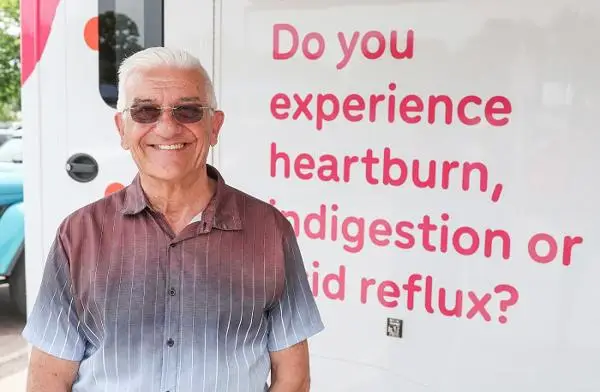Innovative ‘pill-on-a-thread’ test trialled in region
People in the South are taking part in a clinical trial that could lead to a new screening programme for oesophageal cancer.
The BEST4 Screening trial will find out if a new ‘pill-on-a-thread’ test could be used to screen people with heartburn for Barrett’s oesophagus.
The multi-million pound trial is funded by Cancer Research UK (CRUK) and the National Institute for Health and Care Research (NIHR). It will recruit 120,000 people over three years.
University Hospital Southampton’s Dr Patricia Duarte is the local lead for the trial. It is being delivered through mobile screening vans. They have visited several places in the region in recent weeks, including Locks Heath and Bursledon.
Supporting early diagnosis
Heartburn is the most common symptom of Barrett’s oesophagus. It is a precursor condition to oesophageal cancer, where cells in the food pipe start to grow abnormally.
There are over 9,000 new cases of oesophageal cancer in the UK every year. It’s the seventh leading cause of cancer death nationally.
Father and grandfather, John Paffett, 74, from Netley, is a childhood cancer survivor and amputee. He lost his first wife and mother of his three children to breast cancer.
John said: “I suffer a bit of heartburn and I’m not sure what’s causing it, but I take medication to settle it down. Being part of the BEST4 trial not only allows me to help the researchers and potentially other people, but it could also give me peace of mind. Alternatively, it could alert me to something in its early stages when it’s more treatable.
“It took over five years for the sarcoma in my leg to get diagnosed when I was a youngster, so early diagnosis is important to me. I really appreciate how important this trial could be.”

Collecting cells
A capsule sponge test takes ten minutes to do and can be done by a nurse. It is faster and less expensive than an endoscopy.
Researchers hope the capsule sponge test will be able to detect oesophageal cancers earlier. This would reduce the need for intensive treatments and help prevent deaths.
The capsule sponge starts off as a small, coated pill attached to a piece of thread. When a patient swallows the pill and it reaches the stomach, the coating dissolves and the sponge inside it expands to the size of a cherry tomato. The sponge collects cells from the oesophagus as it is gently pulled out from the stomach by a nurse or GP.
The cells are then sent for testing for two proteins. These tell doctors if someone has Barrett’s oesophagus or oesophageal cancer.
Identifying people at greatest risk
The trial is being led from Cambridge University Hospitals NHS Foundation Trust and the University of Cambridge.
Mobile screening vans have arrived in the South East in recent weeks.
Dr Duarte is a Consultant Gastroenterologist at University Hospital Southampton. She is the Principal Investigator for BEST4 in the South East Central region.
Dr Duarte said: “To turn the tide against this deadly cancer, we need to find those people who are at the greatest risk much earlier than we do now. This group includes people over the age of 55 with chronic heartburn.
“The capsule sponge test is much quicker, less expensive and can be delivered in the community. We hope that the BEST4 Screening trial will help us identify more people earlier and crucially reduce deaths from oesophageal cancer.”
Building on many years of research
The trial follows decades of research by Professor Rebecca Fitzgerald and a team of scientists, clinicians and nurses in Cambridge. They invented and refined the capsule sponge test.
Prof Fitzgerald said: “This trial could fundamentally transform the lives of people affected by oesophageal cancer by providing the crucial evidence needed to make it a viable screening programme, rolled out to every part of the UK.”
CRUK has funded several successful clinical trials to demonstrate that the test is safe and accurate. BEST3 showed that the capsule sponge test picks up ten times more cases of Barrett’s oesophagus in people with chronic heartburn, compared to routine GP care.
More than 24,000 capsule sponge tests have been performed in pilot programmes across England, Scotland and Northern Ireland in recent years.
Taking screening into the community
The trial is open to men aged 55 to 79 and women aged 65 to 79 who currently receive medication for chronic heartburn or acid reflux.
Chief Executive of CRUK, Michelle Mitchell, said: “We are proud to be supporting this landmark clinical trial, bringing the capsule sponge test into Bursledon and offering it to a much wider group of patients. After many decades of research, we’re on the cusp of transforming oesophageal cancer diagnosis forever.”
BEST4 is supported by the NIHR’s Research Delivery Network (RDN). It helped secure the mobile screening vans to bring the research into the community.
Dr Waleed Fateen is the Speciality lead for Gastroenterology and Hepatology at the NIHR South Central Regional RDN. He added: "The BEST4 trial is a major step forward in rethinking how we deliver cancer screening, not just in hospitals, but right at the heart of local communities. It’s an excellent example of how research can be translated into real-world impact."
More information about how to join the Best4 Screening trial can be found here.
Image credit: Cancer Research UK